Wildlife World offers advice for the winter
 |

With Christmas fast approaching, temperatures are dramatically dropping making it very difficult for some of Britain’s favourite garden birds to survive the harsh conditions. Wildlife World is offering its advice to all bird lovers and keen gardeners on how they can enhance their gardens to help small birds to survive what is expected to be a bitterly cold winter, especially in January and February.
The wildlife experts are encouraging gardeners to continue to care for birds, including providing regular fresh food and a shelter throughout the winter months, despite regular gardening becoming redundant due to the change in weather conditions.
Although temperatures are set to drop severely, gardeners can still expect to see some of the most common garden birds, such as robins, starlings, blackbirds and thrushes in gardens and should continue feed them into the winter. As conditions get colder, bushes begin to drop their produce and the ground hardens making it extremely difficult for birds to find their natural food sources, such as berries, seeds and earthworms. Because of this, birds and their young will seriously lack the key nutrients needed to survive.
Wildlife World encourages gardeners to offer fresh food for garden birds as much as twice a day to help them to maintain their strength. Highly nutritious foods such as seed mixes and suet based foods in particular can offer birds double the amount of energy as other foods. Spreading food across different areas of a garden can attract a wide variety of species according to their feeding habits. Whilst some feed from trees, winter favourites such as robins and blackbirds are ground feeders. For this reason Wildlife World strongly suggests scattering some food on the ground for these species to gather.
As well as ensuring a sufficient amount of food is available, Wildlife World also urges gardeners to provide fresh water daily in place of a bird’s natural water source, which may freeze over. Wildlife World offers a selection of bird baths, including the Coniston, Blue Dipper and Echoes bath, designed for all size gardens to attract garden birds to drink from and bathe in.
Whilst birds do not hibernate throughout the winter, a warm home is still extremely important for the survival of any species. Wildlife World suggests that placing a nest box or roosting pocket in the garden will not only attract birds but will provide extra support for them throughout the winter. Placing Wildlife World’s roosting pockets in gardens ahead of the winter months can save one third of a bird’s body fat, which helps them to maintain their body heat. This is a life-saver for birds throughout winter as it helps their bodies to withstand the cold conditions.
Open-fronted nest boxes such as Wildlife World’s Teapot Nester is a particular favourite for robins and wrens and offers an attractive addition to any garden. Made from frost-resistant hi fired ceramic, the nester is designed to withstand the harsh conditions of the winter and can be easily mounted on any flat surface in the garden. When filled with Wildlife World’s nesting wool, the Teapot Nester is the perfect home for robins and small birds and provides them with extra warmth throughout the winter.
Wildlife World also offers a wide selection of bird nest boxes, such as the Urban Bird Nester, designed for smaller gardens. The closed-front nest box can be used by all garden bird species and can provide a perfect habitat in urban areas where natural habitats can be hard to find. Other nesters, including the Complete Bird Biome, Natural Log Box, and colourful New England boxes are all also an ideal shelter for garden birds which can be used all year round to benefit and attract British garden birds throughout the winter.
 |
|